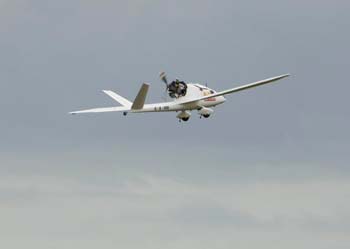Lancaster helps develop unmanned aircraft

Lancaster University has been awarded £225,000 for research into technologies designed to enable the routine use of Unmanned Air Vehicles in non-segregated airspace.
ASTRAEA is a £32m national collaborative programme with the goal of opening up civil airspace to unmanned autonomous vehicles. Specifically, it is looking to overcome the technological and regulatory barriers that currently prevent UAVs' safe and routine operation alongside manned aircraft.
The ASTRAEA partners include not just Lancaster but the universities of Leicester, Bath, Cranfield, Loughborough, Aberystwyth, Sheffield and the West of England, working alongside major companies such as BAE Systems, Thales UK, Rolls-Royce, EADS, Flight Refuelling and QinetiQ. The public sector is represented by the Department of Trade and Industry and a number of the regional development bodies.
The use of UAVs could revolutionise police and fire service surveillance, coastal surveillance, power and pipeline inspections and mobile phone and broadband services, which currently rely on manned aircraft.
Dr Plamen Angelov, of the Department of Communications Systems at InfoLab21, is the Principal Investigator for Lancaster University on two ASTRAEA projects led by Thales UK which focus on Adaptive Routing and Collision Avoidance Systems.
Dr Angelov said: “The unmanned aircraft can be seen as an autonomous system which takes off, lands and manoeuvres successfully without direct human interference unless it is needed. To make this possible, one needs to address different problems. For example, the unmanned aircraft needs to avoid obstacles autonomously and safely; another issue is to fly an optimal route in terms of fuel consumption, time and other factors, such as storms or mountainous terrain.”
ASTRAEA is a key element of a national strategy to build on the collective capability of ‘UK aerospace plc’ in the realm of aerospace technology, with clear benefits in terms of improved competitiveness, high-value jobs and sustainable economic growth.
The Secretary of State for Trade and Industry Alastair Darling said: “ASTRAEA is a significant programme for the UK in establishing our credentials in the rapidly growing field of UAV development. It will strengthen collaboration across industry, universities and regulatory authorities, positioning the UK amongst the world’s leaders in UAV technology.”